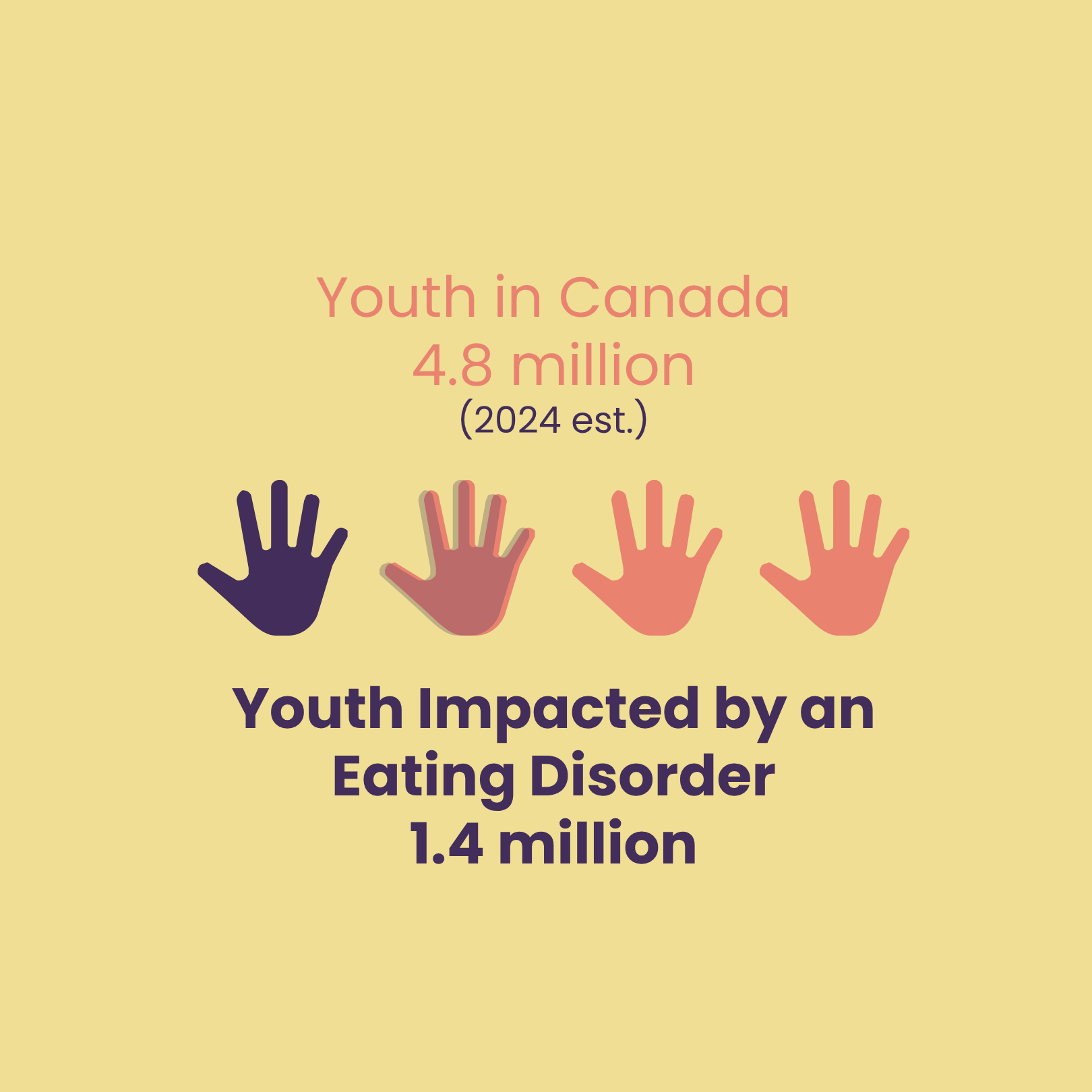
But the real danger is silence.
When a child or teen avoids eating, fixates on “good” or “bad” foods, or seems anxious at mealtimes, it’s probably not just picky eating. It’s likely fear of judgment or not “measuring up”.
For some, that fear gathers speed like something chasing them in the dark, until food becomes the only thing they can control to keep the chaos from closing in.
The risks of misunderstanding this monster range from self-harm, cardiac arrest, or suicide.
The majority of all mental illnesses start in childhood. EATING DISORDERS are the deadliest mental illness after opioid addiction. Too many children & youth suffer quietly because adults mistake their distress for something else.
One in four 12-to-25-year-olds are impacted by an eating disorder.
Yet most people are unaware that when a young person starts using food control to cope with distress, it’s not vanity or stubbornness — it’s likely survival from brain pain. The mortality rate for having an eating disorder is estimated as high as 15%. Early recognition can save a life. Prevention would be even better.
See What You Can Do
Nearly 1 in 4 Canadian adolescents (12-25) struggle with an Eating Disorder.
An estimated 1.4 million Canadians aged 12–25 (out of 4.8 million youth as of 2024) are living with an eating disorder. At least 1 in 8 adolescents are considered “at risk” of developing one.
There is no single cause behind eating disorders which is why they are called “complex” illnesses. For each child or adolescent, vulnerability develops through a mix of biological, psychological, and social influences. These factors can overlap and interact in ways that make some youth more at risk than others.
Despite serious health complications, only 20% of young people living with an eating disorder seek treatment. And yet, the mortality rate associated with Anorexia alone is 12X greater than all other diseases for females 15-24 years-old.
British Columbia has one of the highest reported incidences of eating disorders hospitalizations in Canada next to Ontario.

Our Mission
We are on a mission to help parents, guardians, and educators recognize early signs of eating disorders, gently disrupt harmful patterns, and build understanding and trust so kids feel safe expressing their feelings about food and body image — helping to prevent the spiral into silence and shame before a mental health crisis takes hold.
More than 75% of eating disorders start in childhood. Since the pandemic, hospitalizations have soared — and more school-aged kids, some as young as pre-puberty, are now being diagnosed. And yet…
In Canada, prevention of eating disorders is still underfunded and overlooked. Programs focused on other health issues, like obesity, often get priority — even though weight-focused messaging can unintentionally fuel the very illnesses we should be preventing. (Canadian Eating Disorders Strategy, 2019–2029)
Meanwhile, kids are bombarded with weight-loss messages from media, influencers, and even family. Too many suffer in silence because they don’t ‘look’ sick enough to be noticed. The good news is: we can notice sooner — before unhealthy patterns get hardwired in.
The weight of growing up in a biased culture.
-
“When I was 15, my parent’s concern about my weight often showed up as painful comments. What I really needed was compassion, but all I felt was shame and loneliness. Then restrictive dieting took over my life and I starved myself, believing that being thin would make me feel like ‘enough’. If you’re a parent, please know that your words matter… more than you might realize.”
—Viktoria, 27, recovered
-
“What started out as healthy choices and fitness goals changed quietly and unsuspectingly into punishment, withholding and starvation. Watching her struggle, waste away and become fearful of food - something that used to bring us together to be social and celebrate soon brought her anxiety and sadness. Learning to walk a delicate tightrope everyday and find the tools to help someone learn to love themselves again - once it begins it may truly never end.”
— Liz, mother of a youth in recovery
-
“As a local family physician of 20 years, I see far too often the despair in finding resources for families and youth with body image and mental health disorders. Children and youth with eating disorders need us to listen, to make proactive, preventative care a priority, and to provide families with the support they deserve for this deadly illness.”
— Dr. Maryam Zeineddin, MD, CCFP, FCFP and past President of BC Family Doctors
Most kids with an eating disorder don’t look sick.
They’re suffering in silence.
Early signs of an eating disorder are easy to miss. Fewer than 6% of those affected are underweight. Too often, their struggles stay silent.
When adults stay quiet about their concerns—or mistake weight loss for “healthy” without seeing the harmful behaviours or thought patterns behind it—they can unintentionally contribute to the problem.
Sometimes we worry—but don’t know what to say or do.
Help kids feel seen and heard.
We help parents, guardians, and educators start gentle, informed conversations that protect, support, and empower children, adolescents and teens.
-
Get ahead of the curve – Learn what disordered eating really looks like in kids of ALL kinds —before it spirals.
-
Talk with confidence – Our tools will help you start honest, age-appropriate conversations.
-
Raise resilient kids – Help kids build a strong sense of self, body trust, and emotional awareness.
Eating disorders often start from "disordered eating" behaviour patterns.
〰️
Eating disorders often start from "disordered eating" behaviour patterns. 〰️
Parents:
Recognize the signs early.
Want to feel more confident spotting the red flags at home?
🧠 Backed by experts in Psychology, Education, Parenting, and Youth, our 90-minute Beyond Body Talk workshop helps parents spot early signs, uncover hidden roots, and open age-appropriate conversations about food, body image, and wellbeing.
Educators:
Explore the workshop.
Want your staff and parent community to feel prepared to recognize disordered eating early? Beyond Body Talk gives adults practical tools and language to open up conversations with confidence.
👉 Share with your PAC or book a workshop for your parent community today to foster a culture of care between parents, teachers, and students.
“As you know, eating disorders are on the rise and the Internet is not helping matters for this generation of children and youth. Congratulations on launching this initiative.”
Donors:
Be part of a child’s safety net.
Your gift helps provide workshops, tools, and support that give parents the confidence to step in early — before an eating disorder takes hold. Together, we can protect kids from years of silent suffering.
💜 Early parenting education can save a lifetime of struggle. It could even save a life.
Our Resources
As seen & heard in the media












